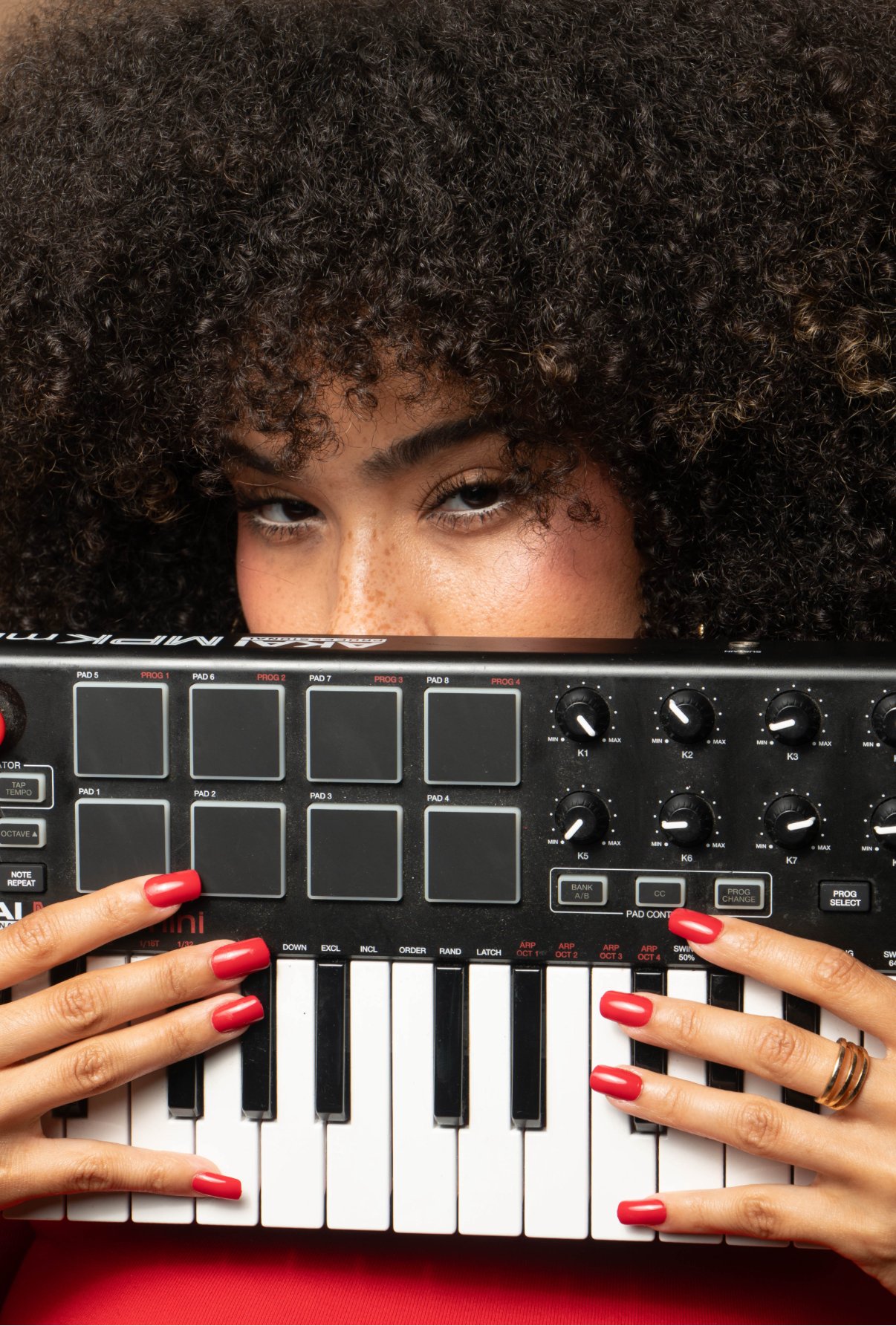Rian Wyld: Soulful Storytelling and Standing Ten Toes Down
INTERVIEW TOREY SMITH PHOTOGRAPH LLOYD BARNES
Born Iman Gray, Rian Wyld carries her late brother Ryan’s memory into every aspect of her artistry. With a sound she calls “Rap Soul,” Rian blends heartfelt lyricism with the emotional depth of soulful melodies, creating music that resonates with universal experiences—love, loss, and the struggles of everyday life. Grounded in classical training and a lifelong exposure to diverse genres, she approaches hip-hop with both technical mastery and raw authenticity.
An independent artist navigating a male-dominated industry, Rian is unapologetically herself, speaking truth to power, challenging industry norms, and advocating for accountability and female empowerment. From her Bronx base—the birthplace of hip-hop—she draws inspiration from the culture around her while keeping her artistry personal, relatable, and uncompromising. In this interview, Rian Wyld opens up about her creative process, her fight for integrity in the music world, and the legacy she hopes to leave behind.
VALIDATED: You were born Iman Gray but chose the stage name Rian Wyld in honor of your late brother, Ryan. How has his memory continued to shape your purpose and message as an artist?
RIAN WYLD: I carry my brother with me everywhere I go. He lives in my heart, and he’s a part of everything I do, including my music. His memory inspires me to make the most of every opportunity. My overall message is to contribute to the lives of others in a positive way while still standing on business and being my true, authentic self.
VALIDATED: You describe your sound as “Rap Soul.” For readers new to your music, how would you define that genre — and what emotions or stories are at its core?
RIAN WYLD: I want to make soulful music. As a rapper, I want to create relatable songs that move you. It’s about building connections through meaningful topics or situations that we can all relate to, no matter our differences. Everyone goes through many of the same things. We all grieve, we fall in love, and we experience heartache in one way or another. These are the things that make us human, and I write music that taps into that.
VALIDATED: Your early exposure to music came from a basement full of records spanning hip-hop, gospel, R&B, rock, and jazz. How did those sounds influence your identity as both a songwriter and performer?
RIAN WYLD: They say when you know better, you do better. I was blessed to be exposed to great music that has stood the test of time across genres. I believe that makes me a more complete artist than someone who limits themselves to one particular sound. The more types of music you listen to, the more you learn and, hopefully, the more you appreciate. I’m not trying to be a one-dimensional artist.
VALIDATED: You studied classical piano in high school and went on to earn a degree in music. How does that formal training influence the way you approach hip-hop production and lyricism today?
RIAN WYLD: That’s a great question. I believe it gives me a better understanding of the creative process. It’s one thing to like cake; it’s another to understand the recipe for how a cake is made. Once you understand the process, you can put your own spin on things and make it your own. It gives me a lot more control and flexibility to create the sound and flow I want because I understand how all the parts come together.
VALIDATED: Losing a sibling to gun violence is a pain that never fully heals. How do you transform that kind of loss into something creative and empowering instead of destructive?
RIAN WYLD: I do that every day of my life. I would never wish that kind of hurt on anyone. While my music is grounded in reality and real-world issues, I strive to use it to inspire and empower people in ways that aren’t harmful to themselves or others.
VALIDATED: You’ve built your career independently — recording, releasing, and promoting your own work. What have been the biggest challenges and rewards of taking the independent route in today’s music industry?
RIAN WYLD: Well, I think the biggest challenge is breaking through with your integrity intact. There are artists who completely change their image to become who they think the industry wants them to be. I understand the motive, but is it worth losing yourself in the process? Sometimes success can literally be the worst thing that can happen to you.
I want to win, but to me, success means winning while being true to who you are. I’ve chosen the indie route so I can have as much control over my image and art as possible. The reward is that I can be proud of my wins and still be proud of the person I see in the mirror every day.
VALIDATED: Recently, your public criticism of Timbaland and his AI-driven BeatClub platform sparked national conversation. What pushed you to speak out, and what message were you hoping to send to both artists and industry leaders?
RIAN WYLD: It’s sad to see someone so iconic do things that make it harder for other artists coming up after him. We could have simply disagreed, but he made it personal with me, so I addressed him personally. I can appreciate all the great things Timbaland has done in the past and still not agree with the things he’s doing today. Accountability is an act of love.
It’s one thing to use AI as a tool to help you create; it’s another to replace human artistry altogether. He’s taking it too far, and I’m not here for it—not just for myself, but for the artist community as a whole.
VALIDATED: In your diss track aimed at Timbaland, you accused him of exploiting independent artists and prioritizing artificial intelligence over genuine creativity. Do you feel AI poses a real threat to human artistry, or is it more about accountability in how it’s used?
RIAN WYLD: I don’t think it will ever completely replace human artistry, because creators will always create. But I do believe it will take opportunities away from talented people in the name of cutting costs. Timbaland’s virtual artist doesn’t have a voice or a soul, and he gets to keep almost all the money for himself—money that could actually improve the lives of real people.
Again, it’s one thing to use AI as a tool; it’s another to replace human artistry entirely. It’s lazy. It’s selfish. And it disgusts me.
VALIDATED: Some fans applauded your boldness, while others said you were taking on a giant. How did you handle the pressure and attention that came with going viral for your stance?
RIAN WYLD: I honestly don’t worry about it at all. I’m standing ten toes down in how I feel, staying true to who I am. I know my brother is proud of me for fighting the good fight. In a way, he inadvertently created this opportunity for my music to reach more people. It’s a win-win for me, no matter how you look at it. I’m built for this.
VALIDATED: You’ve spoken about the importance of empowering women in hip-hop. What does that empowerment look like to you, and how do you use your platform to make space for more female voices?
RIAN WYLD: It’s a well-known fact that this is a male-dominated industry. If the MeToo movement has shown us anything, it’s that there are many predators who exploit women professionally and sexually. And it’s not just the powerful figures at the top of the labels—they do it at the local level too, from club promoters to studio engineers. I believe we create safe spaces for women by calling out the bad actors and educating them on how to establish boundaries.
VALIDATED: Living in the Bronx since 2015, you’re surrounded by the birthplace of hip-hop. How has that energy and culture impacted your creative evolution?
RIAN WYLD: I feel like I live in the heart of hip-hop. It all started here, and it’s so inspiring to be in this environment. There’s a certain vibe here that you can’t find anywhere else. It’s the source of all things hip-hop, and I can say it pushes me forward. I love it here.
VALIDATED: Your music often speaks to people going through personal struggles. What kind of messages or emotions do you hope listeners walk away with after hearing your songs?
RIAN WYLD: I want listeners to know that I’m right here in the trenches with them. For the most part, we all go through the same kinds of things. I want them to know that I’m just like them—trying to find my way through this thing called life, too. While I don’t have all the answers, I understand the same struggles and know the same joys, more or less. I could be your sister, your cousin, or one of your friends.
VALIDATED: The industry is shifting fast — streaming, AI, algorithms, and social media trends. How do you stay grounded and authentic while still keeping up with the times?
RIAN WYLD: I am surrounded by people who love and appreciate me for who I am at my core. They are not here for the hype, the attention, or clout—they are here for me in the ways that matter most. I could be sweeping and mopping floors, and their love for me would never change. It’s truly a blessing.
VALIDATED: You’ve said your mission is to “record, release, promote, and repeat.” What’s next for Rian Wyld? Are there upcoming projects or collaborations you’re especially excited about?
RIAN WYLD: At the moment, I’m focused on promoting the music I currently have, making sure it gets the attention it deserves. A lot of artists drop song after song without investing the time and energy to promote the first release, and then they wonder why their music isn’t sticking. I plan to keep promoting my current work while also working on a new project. I’m open to collaborating with serious artists, but they have to come correct on the business side. You can expect more music from me sooner rather than later.
VALIDATED: Lastly, when people look back on your career years from now, what do you want them to say about the legacy of Rian Wyld?
RIAN WYLD: I want people to appreciate the love and energy I pour into my artistry. I want them to remember me for speaking truth to power and fighting for opportunities for all of us. More than my public issues with Timbaland, I want people to know that I strive to make the world a safer and better place for all of us to do what we love so much.

